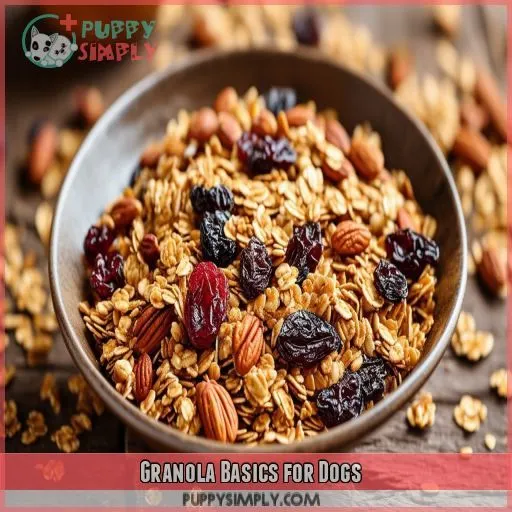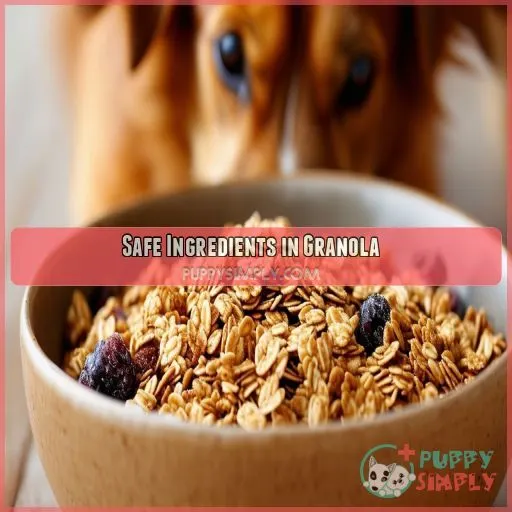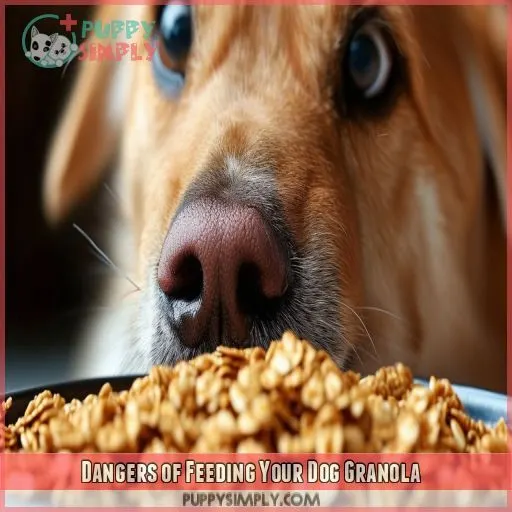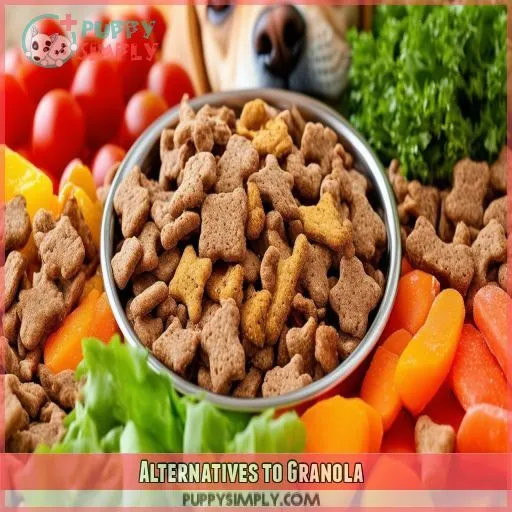This site is supported by our readers. We may earn a commission, at no cost to you, if you purchase through links.

Granola is a tasty treat for humans, but can our furry friends enjoy it too?
Well, the answer is a bit tricky. While some granolas are safe for dogs, others can be harmful or toxic.
It all depends on the ingredients. So, before you offer your pup a bite of your breakfast, let’s take a closer look at the pros and cons of feeding granola to dogs.
Table Of Contents
- Key Takeaways
- Can Dogs Eat Granola?
- Granola Basics for Dogs
- Why Shouldn’t Dogs Eat Granola?
- Safe Ingredients in Granola
- Dangers of Feeding Your Dog Granola
- How Much Granola Can Dogs Eat?
- Can Dogs Eat Granola Bars?
- Alternatives to Granola
- How to Safely Offer Granola to Your Dog
- What Should I Do if My Dog Ate Granola?
- Frequently Asked Questions (FAQs)
- Can dogs eat oats and honey granola bars?
- Can my dog eat a Nature Valley granola bar?
- Can dogs eat Greek yogurt and granola?
- Why can’t dogs have oats?
- How do I make granola bars for my dog?
- Can I give my dog granola with yogurt?
- What happens if my dog eats a lot of granola?
- Can dogs eat granola with peanut butter?
- What are the best alternatives to granola?
- Conclusion
Key Takeaways
- Granola can be a tasty treat for dogs, but it’s important to be cautious. Some ingredients in granola are safe, while others can be harmful or even toxic. Always check the label and consult your vet if you’re unsure.
- Raisins, grapes, macadamia nuts, xylitol, and chocolate are a big no-no for dogs and are commonly found in granola. These ingredients are toxic and can cause serious health issues.
- Granola is often high in sugar, salt, and fat, which can lead to health problems for dogs, including obesity and digestive issues. Even safe granola should be fed sparingly.
- If your dog eats granola, check the ingredients. While some are safe, others are toxic. Contact your vet, especially if toxic ingredients were involved, and monitor your dog for any signs of gastrointestinal distress.
Can Dogs Eat Granola?
While granola can be a tasty treat for humans, you might wonder if it’s safe to share with your furry friend. The short answer is: it depends.
Granola can be safe for dogs, but it’s important to be cautious and informed about the ingredients. Some ingredients commonly found in granola, such as raisins, chocolate, artificial sweeteners, and certain nuts, can be toxic to dogs. Always check the ingredient list before offering any granola to your dog.
It’s best to consult your veterinarian for specific advice regarding your dog’s diet and any questions about safe treats. They can provide guidance on appropriate amounts and frequencies, as well as recommend alternatives if needed.
Granola Basics for Dogs
Granola can be a tasty treat for your dog, but it’s important to be cautious. While most granola is safe, some ingredients are harmful to dogs. Always check the ingredient list before offering any to your pup. Toxic ingredients include raisins, grapes, macadamia nuts, chocolate, and artificial sweeteners. Opt for granola made with rolled oats and puffed brown rice, which are generally safe for dogs.
Even safe granola should be fed in moderation. Granola is often high in sugar, salt, and fat, which can lead to health issues for dogs. It can also cause stomach upset, especially if your dog isn’t used to it. A small amount of granola goes a long way, and it should only make up a tiny portion of your dog’s daily calorie intake.
When choosing store-bought granola, look for options with safe ingredients like oats, seeds, and dried fruit. Avoid granola with high fiber content, as it can cause digestive issues. Always read the label and consult your veterinarian if you’re unsure about any ingredients. It’s better to be safe than sorry when it comes to your furry friend’s health.
Why Shouldn’t Dogs Eat Granola?
While granola can be a tasty treat for humans, it’s not always a healthy option for dogs. Some ingredients commonly found in granola, such as raisins, grapes, macadamia nuts, xylitol, and chocolate, are toxic to dogs and can cause serious health issues.
Toxic Ingredients
Granola often contains toxic ingredients that can be harmful to dogs, including:
- Raisins
- Grapes
- Macadamia nuts
- Xylitol
- Chocolate
High Sugar Content
Granola is often loaded with sugar, which can lead to health problems for your dog, including obesity and blood sugar issues.
High in Fiber
While some fiber is good for dogs, granola’s high fiber content can cause digestive issues and diarrhea. Too much fiber can lead to gastrointestinal upset and even dehydration. It’s important to monitor your dog’s fiber intake to avoid these issues.
Here are some signs that your dog may be experiencing digestive issues due to high fiber intake:
- Vomiting
- Diarrhea
- Abdominal pain
- Loss of appetite
High in Sodium
Granola can be high in sodium, which can lead to dehydration and salt poisoning in dogs. Keep an eye on your dog’s sodium intake to avoid these health risks.
| Column 1 | Column 2 | Column 3 |
|---|---|---|
| Sodium | Dehydration | Salt Poisoning |
Unnecessary Ingredients
Granola often contains unnecessary ingredients like dried fruit. Dogs don’t need fruit in their diet, and some, like raisins, are toxic.
Safe Ingredients in Granola
While most granola is off-limits to your furry friend, some ingredients are safe for dogs to consume. Rolled oats and puffed brown rice form a good base for dog-friendly granola, and you can also add pumpkin seeds, flaxseeds, apples, and bananas in moderation.
Base Ingredients
When it comes to the base ingredients in granola that are safe for dogs, you’re looking at oats and puffed brown rice. These are generally considered safe and non-toxic for canine consumption.
Here are some other safe ingredients to think about:
- Pumpkin seeds
- Flaxseeds
- Apples
- Bananas
Other Safe Ingredients
While rolled oats and puffed brown rice are generally safe base ingredients for granola, other safe ingredients for dogs include pumpkin seeds, flaxseeds, apples, and bananas. These can be given to your dog in moderation, alongside other healthy options like peanut butter granola or berry granola bars.
Dangers of Feeding Your Dog Granola
While granola can be a tasty treat for humans, there are several dangers to think about before feeding it to your dog. Here are some reasons why granola may not be the best choice for your furry friend:
- Toxic Ingredients: Granola often contains ingredients that are toxic to dogs, such as raisins, grapes, macadamia nuts, xylitol, and chocolate. These ingredients can be extremely harmful and even life-threatening to dogs.
- High in Sugar, Salt, and Fat: Granola is typically high in sugar, salt, and fat, which can lead to weight gain and other health issues in dogs. It’s important to remember that dogs have different nutritional needs than humans.
- Stomach Upset: The high fiber content in some granola can cause digestive problems for dogs, especially if they aren’t used to it. This can result in diarrhea and an unhappy pup.
- Incomplete Nutrition: Granola isn’t formulated to meet the nutritional needs of dogs. It lacks essential nutrients that your dog requires for a balanced diet.
- Diabetes: Due to its high sugar content, granola isn’t suitable for dogs with diabetes. It can cause blood sugar spikes and other health complications.
It’s important to remember that even granola with safe ingredients should be fed in moderation and only as an occasional treat. Always opt for dog-specific treats that are formulated with safe and healthy ingredients. If you’re unsure, consult your veterinarian for advice on appropriate treats and your dog’s dietary needs.
How Much Granola Can Dogs Eat?
Portion control is key when it comes to feeding your dog granola. Remember, granola should be a rare treat, not a regular part of your dog’s diet. Here are some guidelines to keep in mind:
- Individual Tolerance: Every dog is unique, and their tolerance for granola can vary. Some dogs may be more sensitive to certain ingredients or have a lower tolerance for treats in general.
- Portion Sizes: The amount of granola you feed your dog should be proportional to their size and calorie intake. As a general rule, treats shouldn’t exceed 10% of your dog’s daily calorie intake.
- Safe Dog Treats: If you’re unsure about portion sizes or want to be extra cautious, opt for dog-specific treats or snacks that are formulated with safe and healthy ingredients. That way, you can make sure your furry friend gets a tasty treat without compromising their health.
Can Dogs Eat Granola Bars?
While it may be tempting to share your granola bar with your furry friend, it’s important to exercise caution. Granola bars are often loaded with sugar, which can be unhealthy for dogs, and they may contain ingredients that are toxic to our canine companions. It’s best to avoid giving your dog granola bars made for humans due to the high sugar content and potential for harmful ingredients. Even a small amount of a granola bar without toxic ingredients could be problematic, so it’s always better to be cautious.
If you’re looking for a safe option, Nature Valley bars are generally fine as long as they don’t contain chocolate or raisins. Peanut butter granola bars are also a good choice, as long as they don’t contain xylitol, an artificial sweetener that’s dangerous for dogs. Oats and honey granola bars are safe in small quantities, but it’s important to remember that even these options should be given sparingly due to their sugar content.
Alternatives to Granola
If you’re looking for alternatives to granola, consider the following safe and healthy options:
- Dog-specific treats: These are formulated with your pup’s health in mind and make for a great alternative to granola bars or other human snacks.
- Homemade treats: You can also make your own dog treats at home! Get creative and experiment with dog-friendly ingredients like peanut butter, pumpkin, and bananas. There are plenty of recipes online for homemade granola and other dog snacks that are sure to get your dog’s tail wagging.
- Vet-approved options: Consult your veterinarian for personalized recommendations. They can suggest healthy dog treats or even help you create a homemade granola recipe that’s safe and nutritious for your furry friend.
How to Safely Offer Granola to Your Dog
If you want to give your dog granola, there are a few things to keep in mind to make sure your furry friend stays safe and healthy:
- Check the Ingredient List: Always read the ingredient list before offering granola to your dog. Avoid granola with toxic ingredients like raisins, grapes, chocolate, xylitol, and macadamia nuts.
- Offer in Moderation: Granola should be given as an occasional treat, not as a regular part of your dog’s diet. Even safe ingredients can be harmful in large quantities.
- Choose Homemade Granola: Consider making your own granola at home, so you can control the ingredients and avoid potential toxins. Peanut butter granola and berry granola bars are generally safe options for dogs.
What Should I Do if My Dog Ate Granola?
If your dog has eaten granola, the first thing you should do is check the ingredient list.
While some granola ingredients like oats and honey are generally safe for dogs, others like raisins, grapes, and chocolate can be toxic.
Contact your veterinarian, especially if the granola contained toxic ingredients, and monitor your dog for any signs of gastrointestinal upset or other health problems.
If your dog shows symptoms of toxicity, seek emergency veterinary care immediately.
It’s also important to keep granola out of your dog’s reach to prevent future accidental ingestion.
Frequently Asked Questions (FAQs)
Can dogs eat oats and honey granola bars?
Oats are fine for dogs, but honey is not—it’s just a sweetener and dogs aren’t designed to handle that many carbohydrates. Granola bars are also packed with sugar and salt, which can lead to diabetes and obesity.
Can my dog eat a Nature Valley granola bar?
Nature Valley granola bars aren’t suitable for dogs due to their high sugar and salt content. Even without toxic ingredients like raisins or chocolate, the refined sugars, oil, and salt offer no nutritional value and could lead to health problems.
Can dogs eat Greek yogurt and granola?
Yes, dogs can eat Greek yogurt in moderation, as long as they aren’t lactose intolerant and the yogurt doesn’t contain added sugars, flavors, or xylitol.
Most granola is safe for dogs, but some ingredients, like raisins, chocolate, and artificial sweeteners, are toxic to dogs.
Why can’t dogs have oats?
Dogs can eat plain porridge oats, but only in small amounts. Oats are high in fibre and calories, so eating too much can lead to digestive issues, including stomach upset, vomiting, and bloat.
How do I make granola bars for my dog?
Bake and Destroy has a vegan granola bar recipe that’s dog-friendly. It includes oats, sunflower seeds, almond slivers, cashews, ginger, and dried cranberries. The bars are baked at 300°F for 20 minutes.
Can I give my dog granola with yogurt?
Dogs can eat granola with yogurt, but only in moderation. Granola is safe for dogs when it’s mostly oats and brown rice. Avoid harmful ingredients like raisins, grapes, macadamia nuts, xylitol, and chocolate.
What happens if my dog eats a lot of granola?
Your dog may experience weight gain, nutritional imbalance, and digestive issues like temporary diarrhea or gastrointestinal upset.
Can dogs eat granola with peanut butter?
Yes, dogs can eat peanut butter granola, but only if it doesn’t contain xylitol. Xylitol is a sweetener that’s toxic to dogs. Peanut butter is safe for dogs and provides healthy fats, but always check the ingredients list first.
What are the best alternatives to granola?
If you’re looking for alternatives to granola, consider these options:
- Oatmeal and brown rice
- Homemade treats with pumpkin and sweet potato
- Freeze-dried meat treats
- Commercially-made dog treats.
Conclusion
So, can dogs eat granola?
Yes and no. Some ingredients in granola are safe for dogs, but others can be harmful or toxic.
It’s important to check the ingredients before offering your dog any granola.
While some dogs may enjoy an occasional bite of granola with safe ingredients, it’s best to offer it in moderation and be mindful of the potential risks.
If you’re unsure, it’s always best to consult your veterinarian first.















